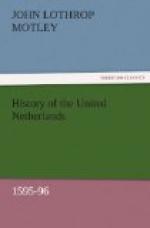Yet there is no doubt that the prince had a sincere respect for his father, and had bitterly sorrowed at his death. When a Spanish officer, playing chess with him, in prison, had ventured to speak lightly of that father, Philip William had seized him bodily, thrown him from the window, and thus killed him on the spot. And when on his arrival in Brussels it was suggested to him by President Riehardat that it was the king’s intention to reinstate him in the possession of his estates, but that a rent-charge of eighteen thousand florins a year was still to be paid from them; to the heirs of Balthazar Gerard, his father’s assassin, he flamed into a violent rage, drew his poniard, and would have stabbed the president; had not the bystanders forcibly inteferred. In consequence of this refusal—called magnanimous by contemporary writers—to accept his property under such conditions, the estates were detained from him for a considerable time longer. During the period of his captivity he had been allowed an income of fifteen thousand livres; but after his restoration his household, gentlemen, and servants alone cost him eighty thousand livres annually. It was supposed that the name of Orange-Nassau might now be of service to the king’s designs in the Netherlands. Philip William had come by way of Rome, where he had been allowed to kiss the pope’s feet and had received many demonstrations of favour, and it was fondly thought that he would now prove an instrument with which king and pontiff might pipe back the rebellious republic to its ancient allegiance. But the Dutchmen and Frisians were deaf. They had tasted liberty too long, they had dealt too many hard blows on the head of regal and sacerdotal despotism, to be deceived by coarse artifices. Especially the king thought that something might be done with Count Hohenlo. That turbulent personage having recently married the full sister of Philip William, and being already at variance with Count Maurice, both for military and political causes, and on account of family and pecuniary disputes, might, it was thought, be purchased by the king, and perhaps a few towns and castles in the united Netherlands might be thrown into the bargain. In that huckstering age, when the loftiest and most valiant nobles of Europe were the most shameless sellers of themselves, the most cynical mendicants for alms and the most infinite absorbers of bribes in exchange for their temporary fealty; when Mayenne, Mercoeur, Guise, Pillars, Egmont, and innumerable other possessors of ancient and illustrious names alternately and even simultaneously drew pensions from both sides in the great European conflict, it was not wonderful that Philip should think that the boisterous Hohenlo might be bought as well as another. The prudent king, however, gave his usual order that nothing was to be paid beforehand, but that the service was to be rendered first; and the price received afterwards.
The cardinal applied himself to the task on his first arrival, but was soon obliged to report that he could make but little progress in the negotiation.




